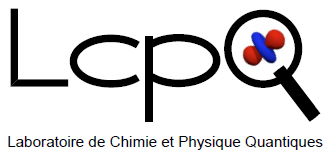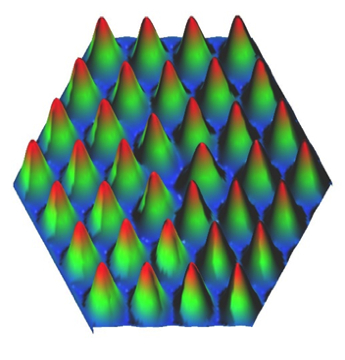Wigner crystallization in the electron gas
THEORETICAL CHEMISTRY AND COMPUTATIONAL MODELING

Lab: LCPQ
Duration: NanoX master Internship (8 months part-time in-lab immersion)
5 months full-time internship
6 months full-time internship
Latest starting date: 12/02/2024
Localisation: Batiment 3R1
118 Route de Narbonne
31062 Toulouse
Supervisors:
Arjan BERGER arjan.berger@irsamc.ups-tlse.fr
Stefano EVANGELISTI stefano@irsamc.ups-tlse.fr
This research master's degree project could be followed by a PhD
Work package:
At low density, the electronic repulsion in a homogeneous electron gas is much more important than its kinetic energy. Consequently, electrons tend to localize in space: at very low density, an electron gas can undergo a phase transition to a structure where each electron occupies a fixed position in a cubic or hexagonal system. This phenomenon is called Wigner crystallization, and was theoretically predicted by Eugene Wigner in 1934 [1].
We propose to study this phenomenon numerically in an electron gas in one, two and three dimensions. The objective of the internship is to calculate the ground-state energies of Wigner crystals. This can be done in two different ways
• We start from a purely classical electron gas and then introduce the quantum effects such as the zero-point energy of the electrons. The zero-point energy comes from the fact that in the classical electron gas the electrons occupy precise positions in space which violates the Heisenberg uncertainty principle. To correct for this we have to take into account the zero-point energy. Further contributions to the energy will be obtained from perturbation theory.
• We perform numerical calculations for finite Wigner crystals using accurate quantum-chemistry approaches that can capture electron correlation such as coupled cluster theory and configuration inter- action.
The internship can cover either (or both) of these approaches depending on the interest of the candidate.

References:
[1] E. Wigner, Phys. Rev. 46, 1002 (1934)
[2] W Deshpande et al., Nature Physics, 4, 314 (2008)
Areas of expertise:
Wigner crystallization; strong electron correlation; ab initio theory; quantum chemistry methods
Required skills for the internship:
It is desirable that the candidate for this internship likes to discuss and exchange ideas. It is also an advantage if the candidate has some programming skills.
